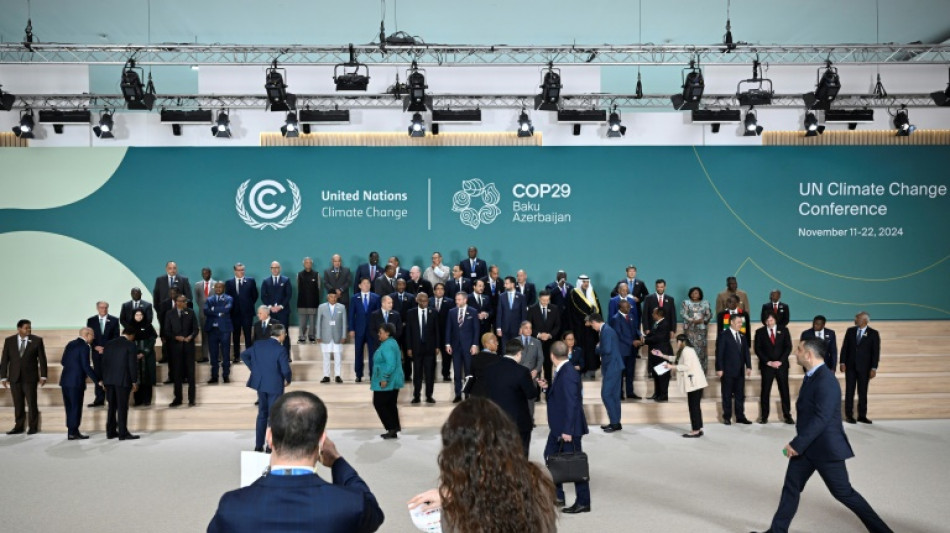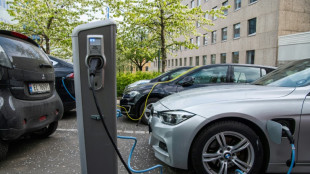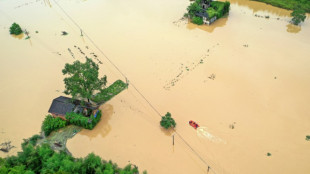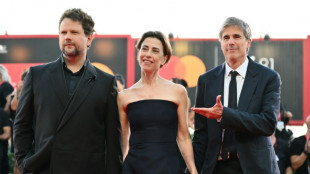
-
 Rosita Missoni of Italy's eponymous fashion house dies age 93
Rosita Missoni of Italy's eponymous fashion house dies age 93
-
27 sub-Saharan African migrants die off Tunisia in shipwrecks

-
 UK grime star Stormzy banned from driving for nine months
UK grime star Stormzy banned from driving for nine months
-
Neil Young dumps Glastonbury alleging 'BBC control'

-
 Swiatek battles back to take Poland into United Cup semis
Swiatek battles back to take Poland into United Cup semis
-
Electric cars took 89% of Norway market in 2024

-
 Rival South Korea camps face off as president holds out
Rival South Korea camps face off as president holds out
-
French downhill ace Sarrazin out of intensive care

-
 Djokovic cruises past Monfils as rising stars impress in Brisbane
Djokovic cruises past Monfils as rising stars impress in Brisbane
-
Montenegro mourns after gunman kills 12

-
 Sales surge in 2024 for Chinese EV giant BYD
Sales surge in 2024 for Chinese EV giant BYD
-
Agnes Keleti, world's oldest Olympic champion, dies at 103

-
 Andreeva, Mpetshi Perricard showcase Australian Open potential
Andreeva, Mpetshi Perricard showcase Australian Open potential
-
Afghan refugees suffer 'like prisoners' in Pakistan crackdown

-
 Coach tight-lipped on whether Rohit will play in final Australia Test
Coach tight-lipped on whether Rohit will play in final Australia Test
-
Blooming hard: Taiwan's persimmon growers struggle

-
 South Korea's impeached president resists arrest over martial law bid
South Korea's impeached president resists arrest over martial law bid
-
Knicks roll to ninth straight NBA win, Ivey hurt in Pistons victory

-
 'Numb' New Orleans grapples with horror of deadly truck attack
'Numb' New Orleans grapples with horror of deadly truck attack
-
Asia stocks begin year on cautious note

-
 FBI probes 'terrorist' links in New Orleans truck-ramming that killed 15
FBI probes 'terrorist' links in New Orleans truck-ramming that killed 15
-
2024 was China's hottest year on record: weather agency

-
 Perera smashes 46-ball ton as Sri Lanka pile up 218-5 in 3rd NZ T20
Perera smashes 46-ball ton as Sri Lanka pile up 218-5 in 3rd NZ T20
-
South Korea police raid Muan airport over Jeju Air crash that killed 179

-
 South Korea's Yoon resists arrest over martial law bid
South Korea's Yoon resists arrest over martial law bid
-
Sainz set to step out of comfort zone to defend Dakar Rally title

-
 New Year's fireworks accidents kill five in Germany
New Year's fireworks accidents kill five in Germany
-
'I'm Still Here': an ode to Brazil resistance

-
 New Orleans attack suspect was US-born army veteran
New Orleans attack suspect was US-born army veteran
-
Australia axe Marsh, call-up Webster for fifth India Test

-
 Jets quarterback Rodgers ponders NFL future ahead of season finale
Jets quarterback Rodgers ponders NFL future ahead of season finale
-
Eagles' Barkley likely to sit out season finale, ending rushing record bid

-
 Syria FM hopes first foreign visit to Saudi opens 'new, bright page'
Syria FM hopes first foreign visit to Saudi opens 'new, bright page'
-
At least 10 dead in Montenegro restaurant shooting: minister

-
 Arteta reveals Arsenal hit by virus before vital win at Brentford
Arteta reveals Arsenal hit by virus before vital win at Brentford
-
Palestinian Authority suspends Al Jazeera broadcasts

-
 Arsenal close gap on Liverpool as Jesus stars again
Arsenal close gap on Liverpool as Jesus stars again
-
Witnesses describe 'war zone' left in wake of New Orleans attack

-
 Cosmetic surgery aficionado Jocelyne Wildenstein dies aged 79: partner
Cosmetic surgery aficionado Jocelyne Wildenstein dies aged 79: partner
-
Tschofenig takes overall Four Hills lead after second leg win

-
 10 killed in New Year's truck ramming in New Orleans, dozens hurt
10 killed in New Year's truck ramming in New Orleans, dozens hurt
-
Leeds and Burnley held to draws as Windass hits Wednesday wonder strike

-
 New Orleans truck attack: what we know so far
New Orleans truck attack: what we know so far
-
Saudi executes at least 338 people in 2024: AFP tally

-
 Migrants crossing Channel to UK in 2024 soar by 25 percent
Migrants crossing Channel to UK in 2024 soar by 25 percent
-
Power restored to most of Puerto Rico: utility

-
 Seko Fofana joins Rennes after Saudi Arabia stint
Seko Fofana joins Rennes after Saudi Arabia stint
-
Brazil's Amazon saw highest number of fires in 17 years: agency

-
 McGregor wants no let-up as Celtic aim to maintain Old Firm grip
McGregor wants no let-up as Celtic aim to maintain Old Firm grip
-
Truck ramming kills 10 New Year's revelers in New Orleans, injures dozens


Failure haunts UN environment conferences
Negotiators were struggling to reach a deal Saturday at UN climate talks in Baku. If they fail, it would not be the first time.
Since the first UN climate conference in 1995, several of the annual sessions have descended into acrimony or even failed completely because of a lack of consensus.
COP6 in The Hague in 2000 marked the only time the talks were suspended. They resumed half a year later in so-called COP6-2 in Bonn, the headquarters of the UN Framework Convention on Climate Change.
COP6 took place in the midst of disputes over the razor-thin US election, with negotiators uncertain if the next president of the largest economy would be George W. Bush, a climate sceptic, or Al Gore, who later shared the Nobel Peace Prize for his climate activism.
"There was that uncertainty. They couldn't agree. And ministers started leaving and they had to suspend the COP," said Alden Meyer, a veteran watcher of climate diplomacy now at the E3G think tank.
The immediate dispute was on the use of credits from land use, such as forests that counteract greenhouse gases, in the emission cuts required under the landmark Kyoto Protocol.
Paradoxically, the victory of Bush -- who quickly withdrew the US from Kyoto and declared it dead -- spurred action in Bonn, with the European Union and others eager to show that climate action would move forward.
- The ghost of Copenhagen -
Perhaps no climate conference came with as much anticipation -- and resulted in such disappointment -- as COP15 in Copenhagen in 2019.
The election of Barack Obama, who vowed to turn the page on Bush's climate policies, raised hopes sharply and the Copenhagen summit took on epic proportions as leaders from around the world flocked to the wintry Danish capital.
But negotiators who usually do the heavy lifting had expected the leaders to make decisions, resulting in inertia and later in bitterness with smaller countries resenting not having a seat at the table.
Copenhagen turned into a rare modern example of world leaders personally hashing out an agreement, but Obama faced strong pushback from China.
Obama needed a then fast-growing China to be part of an agreement to satisfy domestic opponents who refused otherwise to act on climate, but China rejected binding targets.
The Copenhagen accord in the end offered little on emissions cuts beyond acknowledging the realities of climate change, although wealthy countries also promised to deliver up to $100 billion per year by 2020 to help the poorest nations cope with rising temperatures and disasters.
But bleary-eyed delegates failed to make it a UN agreement due to loud opposition on the floor from a small number of countries -- notably Venezuela, whose envoy slashed her own hand in what she intended as a bloody metaphor for the developing world.
COP -- which stands for Conference of the Parties -- needs "consensus" for decisions, but what that means is a matter of interpretation.
The conference instead simply agreed to "note" the Copenhagen accord among world leaders.
Paul Watkinson, a former French negotiator, said Copenhagen was also marred by logistical problems that sapped momentum.
"In Copenhagen, there was no longer anything to eat or drink on Saturday," he said, referring to the day after the talks' official end, even though COPs rarely finish on time.
The French delegation, he said, had prepared its own coffee machine.
More recently, on November 2, another COP process on biodiversity ended without a decision on committing money to stop the destruction of nature.
The biodiversity COP16 in Cali, Colombia had stretched into an extra night and the Colombian presidency was unable to establish a quorum, with so many delegates either asleep or having boarded return flights.
Colombia has called for a resumption of talks in the first trimester of 2025.
X.M.Francisco--PC
